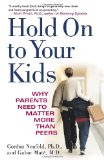 Táto kniha má podnadpis “Prečo treba, aby na rodičoch záležalo viac ako na rovesníkoch”. Niekedy pred časom som tu písala o knihe Nurture assumption, ktorá mala pre zmenu podnadpis “Na rodičoch záleží menej, než si myslíte a na rovesníkoch viac”. V niečom sú tieto knihy protikladmi, ale v niečom sa dosť dopĺňajú.
Táto kniha má podnadpis “Prečo treba, aby na rodičoch záležalo viac ako na rovesníkoch”. Niekedy pred časom som tu písala o knihe Nurture assumption, ktorá mala pre zmenu podnadpis “Na rodičoch záleží menej, než si myslíte a na rovesníkoch viac”. V niečom sú tieto knihy protikladmi, ale v niečom sa dosť dopĺňajú.
Hovorí o tom, že rovesníci naše deti ovplyvňujú rôznymi spôsobmi, aj dobrými aj zlými a že je to normálne. Ale môže to byť deštruktívne vtedy, keď deti nemajú dostatočne silnú väzbu na rodičov a keď rodičia nie sú dostupní (fyzicky, emocionálne, psychicky) a deti to vzniknuté prázdno zaplnia vzťahmi s rovesníkmi – keď rovesníci preberú úlohu rodičov vo vzťahoch. Problém je to preto, že rovesníci dieťatu neposkytnú bezvýhradnú lásku a podporu (“Mám Ťa rada a som tu pre Teba, nech sa deje čokoľvek.”) a deti pre svoj vývoj potrebujú práve takýto silný vzťah, v ktorom sa nemusia báť, že ich niekto zosmiešni, v ktorom majú istotu a nemusia sa s nikým porovnávať. Takýto vzťah s rodičmi má podľa autorov slúžiť ako kompas v živote dieťaťa, obzvlášť v dnešenej dobe, keď sa oveľa menej času trávi v rodinách v porovnaní s časom tráveným s rovesníkmi.
Kniha hovorí aj o tom, prečo sila a manipulácia (tresty a odmeny) nefungujú:
As our power to parent decreases, our preoccupation with leverage increases. Euphemisms abound: bribes are called variously rewards, incentives, and positive reinforcement; threats and punishments are rechristened warnings, natural consequences, and negative reinforcements; applying psychological force is often referred to as modifying behaviour or teaching a lesson. These euphemisms camouflage attempts to motivate the child by external pressure because his intrinsic motivation is deemed inadequate. Attachment is natural and arises from within; leverage is contrived and imposed from without. In any other realm, we would see use of leverage as manipulation. In parenting, such means of getting a child to follow our will have become embraced by many as normal and appropriate.
A o tom, aký je dôležitý vzťah rodič-dieťa:
No matter what problem or issue we face in parenting, our relationship with our children should be the highest priority. Children do not experience our intentions, no matter how heartfelt. They experience what we manifest in tone and behavior… Many a child for whom the parents feel unconditional love receives the message that this love is very conditional indeed… Unconditional acceptance is the most difficult to convey exactly when it is most needed: when our children have disappointed us, violated our values, or made themselves odious to us.
O tom, aký vplyv to má na učenie:
At least initially, peer-oriented children also tend to be more schoolable… School takes children out of the home, separating parent-oriented children from the adults to whom they are attached. For such children the separation anxiety will be intense and the sense of disorientation at school will be acute… The elevated anxiety it provokes interferes with learning… Being alarmed affects our ability to focus and to remember. Anxiety makes it difficult to read the cues and follow directions. A child simply cannot learn well when feeling lost and alarmed.
Children already peer-oriented by the time they enter school do not face such a dilemma. In the first days of school in kindergarten, a peer-oriented child would appear smarter, more confident, and better able to benefit from the school experience. The parent-oriented child, impaired by separation anxiety would, by contrast, appear to be less adept and capable – at least until he can form a good attachment with a teacher… In the short term, peer orientation appears to be a godsend. And it is undoubtedly this dynamic that research taps into when discovering the benefits to early education.
In the long term… the positive effects on learning of reduced anxiety and disorientation will gradually be canceled by the negative effects of peer orientation. Thus follows the research evidence that early advantages of preschool education are not sustainable over time. Peer-oriented kids go to school to be with their friends, not to learn. If these friends are also not into learning, academic performance will slip. When children go to school to be with one another, they are primed only to learn enough not to stand out, to remain with those their own age. Other than that, learning is irrelevant and can even be a liability to peer relationships.
Táto kniha sa mi vpodstate páčila. Píše presne o takom vzťahu s deťmi, aký by som chela mať. Ale zároveň sa mi zdá (čiastočne aj kvôli prečítaniu The Nurture Assumption), že preháňa ten vplyv, ktorý môžu mať rodičia. A napriek tom, že ponúka zopár príkladov, ako zabrániť tom, aby sa deti stali príliš “peer-oriented” alebo čo robiť v prípade, že sa tak už stalo, nie je ich veľa a nie sú veľmi nápomocné.
A potom ešte jedna veľmi zvláštna vec. Píšu o detských priateľstvách v takej rovine, že vpodstate nie sú nutné a nie sú to “ozajstné” (áno, dávajú aj definíciu, aké sú tie ozajstné) priateľstvá. Už len dívajúc sa späť na vlastné detstvo, aj keby neboli ozajstné (čo boli), tak by mi bez nich bolo horšie a niektoré z nich pretrvali až doteraz. Myslím, že v tomto ani zďaleka nebudem jediná. Takže celkovo, kniha stojí za prečítanie, ale treba ju brať s rezervou a skôr sa sústrediť na to posilnenie vzťahu s rodičmi ako no oslabovanie alebo selektovanie vzťahov detí s ich s rovesníkmi.
